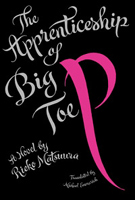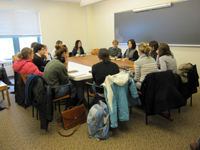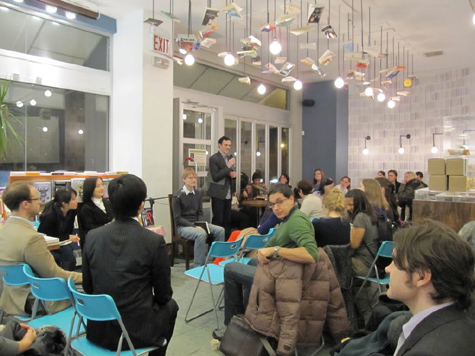An American Travelogue: Let's Just Sing
Rieko Matsuura
Novelist
Publication, departure
I am thrilled that my novel, The Apprenticeship of Big Toe P, has been translated into English and published in the United States. Putting out a book in America and the English speaking world in general with its vast reading population is a dream-come-true for authors who write in languages like Japanese that are notoriously difficult to translate into English. Actually, I had a book deal with an American publisher back in the 1990s to translate and publish this very book; a translator was chosen and I was paid in advance. Unfortunately the deal was cancelled owing to the publisher's circumstances. More than ten years have gone by; the idea of a translated version, even the book itself, had been swept into the recesses of my mind.
 The cover of the English version of Big Toe P has a black background with the title printed in silver and bright pink. It's at once pop and conspiratorial without being vulgar. Gazing at the elegant cover that looked like some exotic animal, the idea of putting this book to the test in the United States that I admired as a young girl for being home to the sexual revolution began to appeal to me. I was both excited and a little bit afraid to receive an invitation from the Japan Foundation, New York to discuss my book directly with American readers. The feeling I had was akin to meeting someone for the first time after exchanging emails.
The cover of the English version of Big Toe P has a black background with the title printed in silver and bright pink. It's at once pop and conspiratorial without being vulgar. Gazing at the elegant cover that looked like some exotic animal, the idea of putting this book to the test in the United States that I admired as a young girl for being home to the sexual revolution began to appeal to me. I was both excited and a little bit afraid to receive an invitation from the Japan Foundation, New York to discuss my book directly with American readers. The feeling I had was akin to meeting someone for the first time after exchanging emails.
A seventeen-year time lag
This trip took place from February 22 to March 2, 2010, seventeen years after Big Toe P was first published in Japan. I would be lying if I said that I wasn't worried whether or not today's readers in the United States would be able to accept the topic of sexual love I wrote about seventeen years ago in a different cultural context. I'd also like to think that I made intellectual and technical strides with my writing since then, which I wanted to share with my American audience. I touched upon my latest novel in the notes I prepared for my talks in the United States.
Indeed I was asked on numerous occasions how the roles of men and women in Japan have changed over the past seventeen years. Similarly, many wondered if my book is being interpreted differently today. Coming from a country that is often regarded to be particularly sexist, I was eager to talk about these points. I explained at the various meetings that the most misogynistic generation of Japanese men are retiring, replaced by men who are able to relate to women naturally without any stubborn preconceived notions, thereby making for a more comfortable environment. I'm sure the audiences were aware how genuinely happy I was about this.
Male-female relationship in Japan
As you may have noticed, I'm quite critical of Japanese men before my generation, and I received several questions related to this.
At a meeting with the Nichibei Exchange (Japan-U.S. Exchange), a group of Japanese living in New York and Americans interested in Japan, an American man opined that the blame for gender inequality does not always rest with the male. Theoretically, he was perfectly correct, his comment reflecting a progressive frame of mind. I replied that Japanese women could not have been faulted for being unable to stand up against inequality because misogyny in Japan used to be fierce and frightening, something Americans may find unimaginable. As a Japanese, it was unfortunate that I had to bring attention to how backwards we were.
Sometimes it's not so straightforward conveying ideas to people with a different cultural background. McNally Jackson Bookstore in New York is known for its selection of books with radical themes. At an event there, I told a Japanese female audience I agreed with her opinion that it could be that it's easier being a woman in Japan rather than in western countries because Japanese men and women look more similar and there is less pressure to be sexualized. Later, she told me that the American audience looked unconvinced. Although I was referring to appearance and sexuality and the translation was accurate, the Americans may have thought I meant gender roles. When it comes to gender roles, Japan's gender gap index is definitely not as high as some western countries, so perhaps it's inevitable the audience wasn't swayed by my argument. I wish we had a chance to debate this point in greater depth.
Discussions about sexual love
It was no surprise that the most interesting questions concerned sexual love, and I was happy to answer those questions.
At Bard College located in a suburb of New York, one of the male students wondered whether the reason why at the end of the story the protagonist chose a male rather than a female lover is because she was hung up on gender. I told him that some Japanese readers would agree with him, but it's precisely because the protagonist was not shackled by new or old conventions of gender or sex so that she was able to choose a partner based on compatibility on sexual principles regardless of gender.
At Panama Hotel in Seattle, a woman studying sexuality who is also in a queer group asked a very good question about why I chose to change the female protagonist's big toe into a penis in a novel on transcending gender. Although the transformed big toe resembled a penis, I responded its function was more akin to a clitoris and that was probably unexpected answer to her. This was also something even I, as the author of the novel, did not realize at the beginning.
At the Donald Keene Center of Japanese Culture at Columbia University, a middle-aged American woman asked me why the transsexual character in the novel is so ordinary. I wasn't sure what specific characteristic she was referring to, but I said that I didn't agree; rather, I thought the character was extremely unique for becoming a woman yet longing for a woman with a penis. I explained that I don't pigeonhole homosexuals or transsexuals, whether they are male or female, in any way, but seek out their individuality. That woman left the hall with bland expressions after some moments although I would have welcomed follow-up questions and further discussion.
Questions from those who study sexuality tend to be in line with sexuality theories. It's the same in Japan but my novels are not built based on existing theories. Instead, I infuse them with what I feel and think so sometimes my novels are disliked or misconstrued because of it. I expected to receive feistier questions; after all, America is home to theories on sexuality. Overall, however, I'm glad to say that the discussions were ended friendly.
Let's just sing
 I knew that not everyone in America is liberal-minded and interested in the subject of sexuality from the news and literature. Some are racially prejudiced and others are ultra-conservative, inflicting violence on those they despise for deviating from the norm. I wasn't too worried about being harassed at the events in the United States because I was a complete unknown in that country, but I did think about how I should react in the event if something happened. In the end, much to my relief, nothing happened. However, at the same time, I felt I experienced just a small slice of America by only meeting with friendly and agreeable people.
I knew that not everyone in America is liberal-minded and interested in the subject of sexuality from the news and literature. Some are racially prejudiced and others are ultra-conservative, inflicting violence on those they despise for deviating from the norm. I wasn't too worried about being harassed at the events in the United States because I was a complete unknown in that country, but I did think about how I should react in the event if something happened. In the end, much to my relief, nothing happened. However, at the same time, I felt I experienced just a small slice of America by only meeting with friendly and agreeable people.
Depending on what fate has in store for me, I may some day encounter hostility in America. However, I've experienced many uncomfortable situations in Japan, therefore I suppose I don't need to undergo further similar experiences in the United States. For now, I want to make sure I always remember the existence of minorities in the United States who endure very difficult lives.
I am glad that this trip was ended productively. Aside from scheduled events, I enjoyed visiting many museums as well as the Seattle Zoo. I was also invited to the home of an American editor and I was happy that I could have a chance to ask a question to the editor who I shall call "E" if my voice sounded like Truman Capote's. The response was no, because his voice was high whereas mine is low.
I always thought that my voice was high pitched, which often cracked when I became tense. I would have been honored to sound like Truman Capote though. "E" is right; normally, my speaking voice is low but when I sing, my voice turns to soprano. One night in snow-blanketed New York, a group of us, including Columbia University graduate students studying Japanese and Japanese literature, went to a Korean karaoke bar. The young graduate students sang many Japanese songs really well. I chose songs by Lou Reed, Rihanna and Alicia Keys. What good memories these have become.
Rieko Matsuura, Novelist
Matsuura majored in French literature at Aoyama Gakuin University. She received the Bungakukai Prize for New Writers for her novel, The Day of the Funeral which she wrote while a student. In 1987, her novel about lesbian lovers titled Natural Woman was published to critical acclaim. She won the Women's Literature Prize for The Apprenticeship of Big Toe P, and the Yomiuri Prize for Literature for Kenshin (A Dog's Body) in 2008. Natural Woman has been translated into French, Italian, Chinese, and Slovene. The Apprenticeship of Big Toe P has also been successful abroad, having been published in French, Italian, Chinese (in Taiwan), and English.
Related Events
Back Issues
- 2025.11.14 Stories from Both Si…
- 2025.10.24 Dialogue through Ani…
- 2025.6. 9 Creating a World Tog…
- 2024.10.25 My Life in Japan, Li…
- 2024.5.24 The 50th Japan Found…
- 2024.5.24 The 50th Japan Found…
- 2024.5. 2 People-to-People Exc…
- 2024.5. 2 People-to-People Exc…
- 2023.12. 7 Movie Theaters aroun…
- 2023.6.16 The 49th Japan Found…


